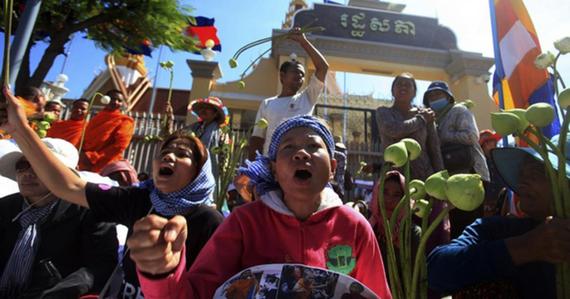Hun Sen, Prime Minister of Cambodia, is the President of the Cambodian People's Party (CPP), the country's ruling party since 1979. In recent years, when an opposition party, the Cambodia National Rescue Party (CNRP), started gaining momentum and making their voices heard, Sen's government found an effective response. Taking a lead from China, it redefined political dissent as "insurrection," made it a crime, and threw the opposition in jail. No one really cared much. At least they don't have killing fields.
The Prime Minister's "bodyguards" are in fact an elite military unit that does much more than protect the Prime Minister's person. In 1997 four hand grenades were thrown into a crowd of CNRP supporters who had gathered to protest judicial corruption in the country. The "carefully planned attack" killed at least 16 people, including children, and wounded more than 100, blowing limbs off street vendors. Sen's bodyguards, dressed in riot gear, were seen in video clearing lines to allow the grenade throwers to escape, and threatening to shoot anyone trying to chase the attackers.
Last October, Kong Sophea and Nhay Chamraoen, Cambodian Parliamentarians and CNRP members, were attacked by "pro-government protesters," who dragged them from their cars, beat them, and stomped on them. The attackers wore scarves to hide their faces, then fled in waiting pickup trucks. Police stood by, doing nothing.
It was widely reported that the attackers were part of Sen's bodyguard corps, who later boasted about their participation. Witnesses recognized the Prime Minister's bodyguards dressed as civilians among the crowd.
Since July of 2014 fifteen leaders of the CNRP have been arrested and given long prison sentences on charges of "insurrection against the government" for organizing and taking part in protest demonstrations. CNRP leader Sam Rainsy has been forced into exile.
The attacks and arrests have largely gone under the radar of anyone not specifically following Asian or Cambodian politics. This may have changed in the last three days.
One of the CNRP members arrested, Meach Sovannara, happens to also be a US citizen. And two American human rights attorneys have used this fact to file a case that could turn human rights law on its head.
On Friday, attorneys Morton Sklar and Nazareth Haysbert filed a lawsuit in Federal Court in Los Angeles against the Hun Sen government of Cambodia on behalf of Sovannara and his family. Charges include false imprisonment of the CNRP leaders along with torture, cruel and inhuman treatment and punishment, and more.
As a rule, foreign governments are protected by sovereignty from being brought to trial in the US, as our leaders are abroad. The Foreign Sovereign Immunity Act, however, recognizes some exceptions, including violent actions again US citizens abroad, or torts (civil damage cases for injuries suffered from violence or abuse). Sovannara's case is the first case in the US to invoke the exceptions to hold officials of a foreign government accountable for human rights violations that affect US citizens. It could open some interesting doors.
The attorneys have also brought the US Anti-Terrorism Act, which allows a plaintiff to sue for both criminal and civil damages for acts of international terrorism, into the case. In words that will get you thinking about definitions, the lawyers argue that the arbitrary detention and torture of Sovannara "rises to the level of international terrorism." A few despotic leaders in our world might want to be paying attention to the possibility that a US court could decide in the near future that kidnapping, holding hostage and torture don't have to be done by an Islamic fundamentalist to be considered terrorism.
The filing of the case was timed to correspond with the US visit of the one of the defendants in the case. Hun Manet is Hun Sen's eldest son and head of Cambodia's military, police and security forces. A West Point graduate, he is being groomed to replace his father at the country's helm. The attorneys argue in the case that the political repression of the CNRP has taken place under his watch and if not with his planning, at least with his approval.
Saturday night outside the La Lune Restaurant in Long Beach, California, where Manet was having dinner, a process server arrived to serve papers on the case. The Long Beach Police Department was in the parking lot to monitor a small protest from the Cambodian community. The process server notified the police of what he was doing and was allowed to go forward.
Manet's bodyguards were not pleased. There was a scuffle. The process server was slammed hard to the ground by one of the bodyguards, landing on his head and spine. This time the police did intervene, called an ambulance, and got the server to a hospital. He is now in ICU and is expected to be there for up to five days while doctors determine if he will need surgery for spinal injuries.
It appears that in the first volley between political repression and human rights law, repression has scored a point. Long Beach police detectives, however, were at the hospital Saturday night questioning the process server.
And there were iPhones, with videos. Stay tuned.
This article is cross-posted on TheCommunity.com.

